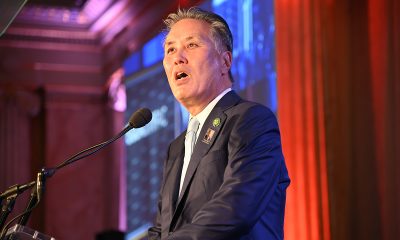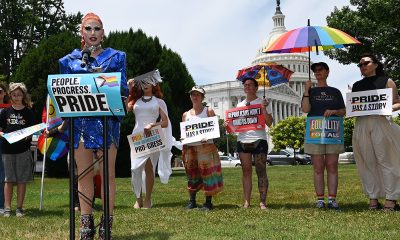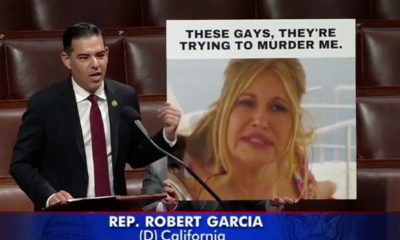News
Schatz introduces bill for discharged gay veterans
‘Restore Honor to Service Members Act’ would streamline process to change paperwork
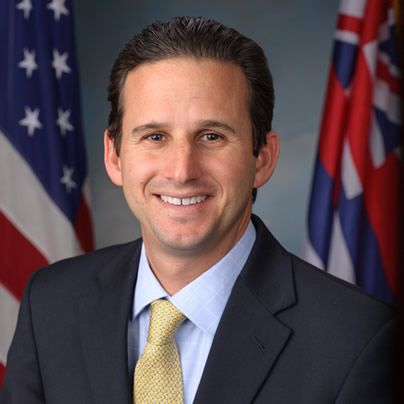
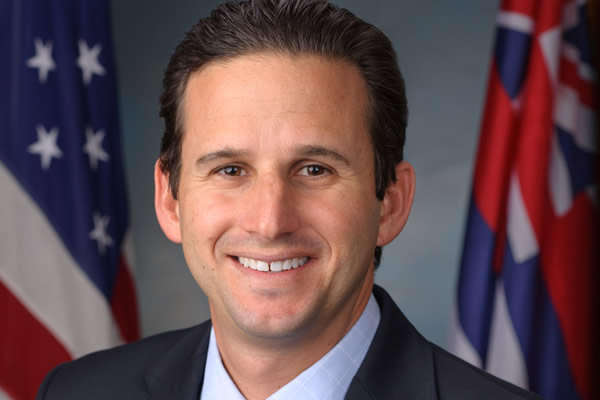
Sen. Brian Schatz (D-Hawaii) has introduced a bill to aid discharged gay veterans. (Photo public domain)
A Hawaii Democrat introduced on Thursday new legislation in the U.S. Senate that would ensure gay veterans discharged because of their sexual orientation have the designation of “honorable” discharge on their records.
The bill, known as the Restore Honor to Service Members Act, would apply to gay veterans who were in service prior to the lifting of “Don’t Ask, Don’t Tell” in 2011, when the U.S. military expelled troops for being openly gay.
Sen. Brian Schatz (D-Hawaii), the chief sponsor, said “Don’t Ask, Don’t Tell” repeal was “a watershed moment,” but his bill would address remaining issues for the estimated 114,000 service members expelled because of their sexual orientation since World War II.
“Yet thousands of former service members still bear the scars of that discrimination, with their military records tarnished with discharges other than honorable and marks on their records that compromise their right to privacy,” Schatz said. “Many of these brave men and women that served our country are currently barred from benefits that they earned and are entitled to, and in the most egregious cases they are prevented from legally calling themselves a veteran. This needs to be corrected now.”
Although many service members were given an “honorable” discharge from the military if they were expelled because of their sexual orientation, others were given “other than honorable,” “general discharge” or “dishonorable” discharge.
As a consequence, these former troops may be disqualified from accessing certain benefits, such as GI bill tuition assistance and veterans’ health care, and may not be able to claim veteran status. In some cases, they may be prevented from voting or have difficulty acquiring civilian employment.
Even troops who received “honorable” discharges may have difficulties in the aftermath of their service because their sexual orientation may be identified as the reason for the discharge.
Although an administrative process already exists for service members to change their records, the proposed legislation would streamline the process to ensure these designations don’t impair former members of the armed forces.
Joining Schatz in introducing the legislation is Sen. Kirsten Gillibrand (D-N.Y.), who said allowing service members to change their discharges if they were expelled because of their sexual orientation demands immediate attention.
“A clean, honorable record is long overdue for veterans who were discharged solely because of who they love,” Gillibrand said. “Our veterans served our country courageously and with dignity and we must act to give them the appropriate recognition they deserve.”
The legislation has 17 co-sponsors — all Democrats. They are Mark Udall (D-Colo.), Mazie Hirono (D-Hawai‘i), Amy Klobuchar (D-Minn.), Al Franken (D-Minn.), Mark Begich (D-Alaska), Gillibrand, Ed Markey (D-Mass.), Ron Wyden (D-Ore.), Michael Bennet (D-Colo.), Ben Cardin (D-Md.), Maria Cantwell (D-Wash.), Chris Murphy (D-Conn.), Barbara Boxer (D-Calif.), Robert Menendez (D-N.J.), Martin Heinrich (D-N.M.), Cory Booker (D-N.J.) and Charles Schumer (D-N.Y.).
Denny Meyer, national public affairs officer for the LGBT group known as American Veterans for Equal Rights, said her organization supports the bill.
“LGBT veterans who served and sacrificed in silence during World War II, Korea, and Vietnam, as well as those who served before and during ‘Don’t Ask Don’t Tell’ in the Gulf War, Iraq, and Afghanistan, deserve to see their service recognized and honored at long last,” Meyer said. “We endorse and support the efforts by Senators Schatz and Gillibrand and Congressmen Pocan and Rangel to move forward the Restoring Honor to Our Service Members Act, which will accelerate discharge upgrades.”
In joint statement, gay Rep. Mark Pocan (D-Wis.) and Charlie Rangel (D-N.Y.), who are taking the lead on the legislation in the House, commended the senators for introducing the Senate companion.
“This bill would close the book on “Don’t Ask Don’t Tell” and provide tens of thousands of gay veterans, who selflessly risked their lives for our nation,” Pocan and Rangel said. “Our bill already has the support of more than 140 House members, and we look forward to working with Senators Schatz and Gillibrand to ensure it can pass Congress and get to the President’s desk.”
Upon the introduction of the bill in July 2013, Rangel said during a conference call with Pocan he wants the White House and the Pentagon to support the legislation.
“We’re hoping we get this involved in the Department of Defense,” Rangel said at the time. “We hope, too — we haven’t talked about it, Mark — but there’s no question we’re looking to get White House support as well.”
Seven months later at the time of Senate introduction, the White House still hasn’t spoken out. The White House didn’t immediately respond to a request to comment on the bill.
Politics
HRC slams White House over position opposing gender affirming surgeries for minors
‘Biden administration is flat wrong on this’
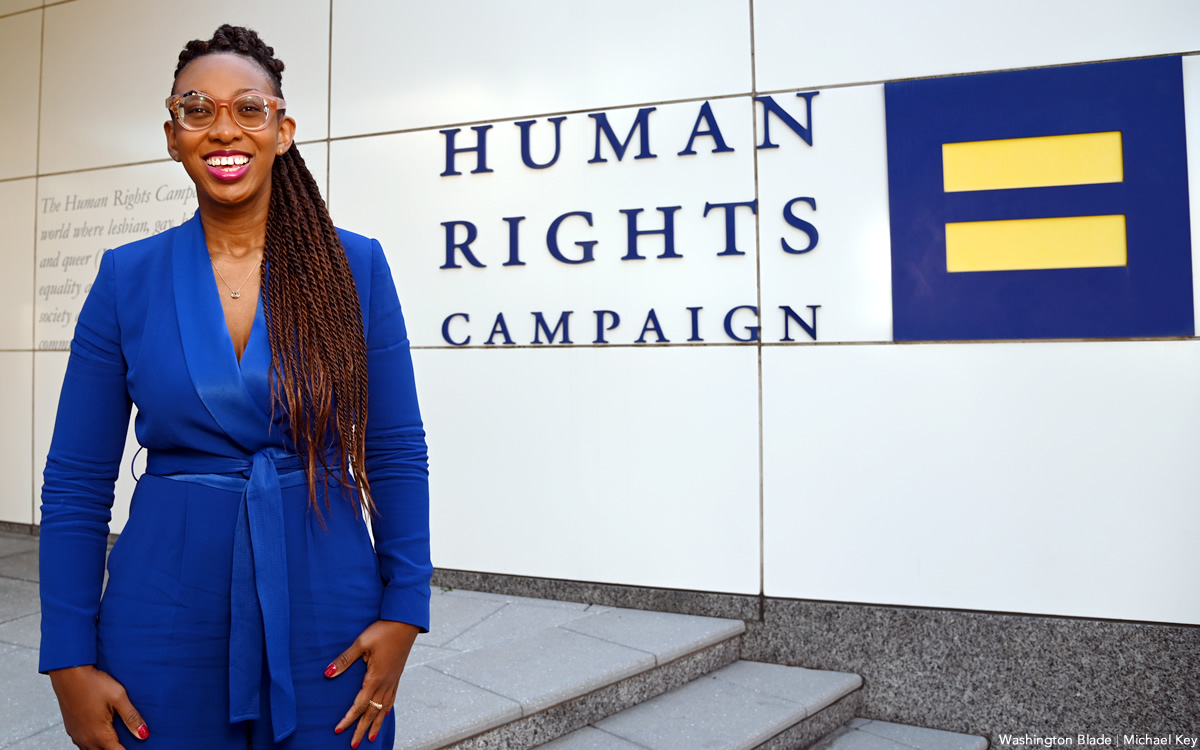
Human Rights Campaign President Kelley Robinson issued a strong rebuke on Tuesday of the Biden-Harris administration’s position opposing gender affirming surgeries for minors.
The New York Times reported on June 28 that the White House, which broadly supports making medical interventions available for transgender youth, had expressed opposition to surgeries for patients under 18, having previously declined to take a specific position on the question.
“Health care decisions for young people belong between a patient, their family, and their health care provider. Trans youth are no exception,” Robinson responded.
“The Biden administration is flat wrong on this. It’s wrong on the science and wrong on the substance. It’s also inconsistent with other steps the administration has taken to support transgender youth. The Biden administration, and every elected official, need to leave these decisions to families, doctors and patients—where they belong,” she added. “Although transgender young people make up an extremely small percentage of youth in this country, the care they receive is based on decades of clinical research and is backed by every major medical association in the U.S. representing over 1.3 million doctors.”
Robinson said the “administration has committed to fight any ban on healthcare for transgender youth and must continue this without hesitation—the entire community is watching.”
“No parent should ever be put in the position where they and their doctor agree on one course of action, supported by the overwhelming majority of medical experts, but the government forbids it,” she added.
HRC is a prominent backer of Biden’s 2024 reelection campaign, having pledged $15 million to support efforts in six battleground states. The organization has a strong relationship with the White House, with the president and first lady headlining last year’s National Dinner.
A White House spokesperson declined to respond to Robinson’s statement.
Campaign for Southern Equality President Allison Scott also issued a statement.
“This is a cowardly statement from an administration that promised to support transgender people. It is a troubling concession to the right-wing assault on transgender Americans, falling for their false narratives about surgical care and betraying a commitment to equality and trust in the medical community,” said Scott.
“Let’s be very, very clear: Government has no business inserting itself into private medical decisions that should be exclusively between patients, their providers, and the patients’ parent or guardian,” Scott added.
“It is dangerous to begin endorsing categorical bans or limits on healthcare, and there is no justification for restricting transgender youth’s access to the very same care that many cisgender youth receive every year — that’s literally the definition of discrimination,” Scott concluded. “We demand the Biden administration retract this thoughtless statement and work to undo its damage.”
Virginia
Parades, community events held to mark Pride Month in Va.
Upwards of 30,000 people attended PrideFest in Norfolk on June 22

Activists across Virginia last month held a series of events to mark Pride Month.
Hampton Roads Pride, a volunteer-run organization founded in 1997, held 37 different Pride events throughout the region in June.
Their biggest event, PrideFest, which is part of their larger three day event, Pride Weekend, celebrated its 36th anniversary on June 22. Pride Weekend took place from June 21-23 and began with a block party at NorVa in Norfolk.
PrideFest took place at Town Point Park, and an estimated 30,000 people attended. More than 70 venders participated, while Todrick Hall and Mariah Counts are among those who performed.
Another PrideFest event with a DJ in the afternoon and live music at night took place in Virginia Beach on June 23. Congressman Bobby Scott and U.S. Sen. Tim Kaine (D-Va.) are among those who attended Pride events in Suffolk on June 30.
Norfolk Mayor Kenneth Alexander, along with members of the Norfolk and Virginia Beach City Councils, also attended the Pride events in their respective cities. Jamar Walker, the first openly gay federal judge in Virginia, also took part.
“You know people all throughout Pride Month, at all of our various events, tell me all kinds of stories about their own experiences and the past of this community … and some of our older folks especially, remember when we couldn’t have this,” Hampton Roads Pride President Jeff Ryder told the Washington Blade on Monday during a telephone interview.
“It was a great year,” he added. “It was a big achievement for us to have unique celebrations in each of our seven communities. Each of these cities is so different from one another, but to be able to create a Pride celebration that’s unique in each of those places was really great, and I think really well received by folks who may not have felt represented previously. We’re always trying to do better, to embrace every aspect of our community, and take a big step forward there this year.”
State Dels. Adele McClure (D-Arlington County) and Alfonso Lopez (D-Arlington County) are among those who spoke at Arlington Pride that took place at Long Bridge Park on June 29. The Fredericksburg Pride march and festival took place the same day at Riverfront Park in Fredericksburg.
Republican Virginia Gov. Glenn Youngkin on June 10 hosted a Pride Month reception in Richmond.
Youngkin in previous years has hosted Pride Month receptions, even though Equality Virginia and other advocacy groups have criticized him for supporting anti-LGBTQ bills.
The Republican governor in March signed a bill that codified marriage equality in Virginia. Youngkin last month vetoed a measure that would have expanded the definition of bullying in the state.
U.S. Supreme Court
Concern over marriage equality in US grows two decades after first Mass. same-sex weddings
Gay and lesbian couples began to marry in Bay State in 2004

Two decades after Massachusetts became the first state to legalize same-sex marriage, a new study reveals both significant progress and ongoing challenges for married LGBTQ couples in the U.S., with a growing sense of insecurity about the future of their rights.
The Williams Institute at UCLA School of Law surveyed 484 married same-sex couples from all 50 states and D.C. The study, released Monday, marks the 20th anniversary of legal same-sex marriage in the U.S.
Researchers found that 93 percent of respondents cited love as a primary reason for marrying, with 75 percent also mentioning legal protections. Over 83 percent reported positive changes in their sense of security, and 74.6 percent noted improved life satisfaction since marrying.
However, the study also highlighted persistent discrimination and growing concerns about the future. About 11 percent of couples who had a wedding reported facing prejudice during the planning process.
Alarmingly, nearly 80 percent of respondents expressed concern about the potential overturning of the 2015 Obergefell v. Hodges decision, which legalized same-sex marriage nationwide. This anxiety has been exacerbated by initiatives like Project 2025, a conservative policy blueprint that some fear could roll back LGBTQ rights if implemented.
The possibility of a former President Donald Trump victory in the upcoming election has further intensified these concerns. Many respondents cited Trump’s previous U.S. Supreme Court appointments and his statements on LGBTQ issues as reasons for their apprehension. One participant stated, “The thought of another Trump presidency keeps me up at night. We’ve come so far, but it feels like our rights could be stripped away at any moment.”
The current political climate has 29 percent of respondents considering moving to another state, with 52.9 percent citing socio-political concerns as a primary reason. This reflects a growing sense of insecurity among LGBTQ couples about their rights and freedoms.
Brad Sears, founding executive director of the Williams Institute, noted, “The data clearly show that marriage equality has had a profound positive impact on same-sex couples and their families. However, it also reveals ongoing challenges and serious concerns about the future of these rights in light of current political trends and the upcoming election.”
Christy Mallory, legal director at the Williams Institute and lead author of the study, added, “This research provides crucial insights into the lived experiences of same-sex couples two decades after marriage equality began in the U.S. The high level of concern about potential loss of rights underscores the continued importance of legal protections and public support for LGBTQ+ equality.”
The study found that 30 percent of surveyed couples have children, with 58.1 percent of those parents reporting that marriage provided more stability for their families. However, many of these families now worry about the security of their legal status in the face of potential policy changes and shifting political landscapes.
As the nation reflects on two decades of marriage equality, the study underscores both the transformative power of legal recognition and the ongoing need for vigilance in protecting LGBTQ+ rights. The findings highlight the complex reality faced by same-sex couples in America today: Celebrating hard-won progress while grappling with uncertainty about the future, particularly in light of upcoming political events and potential shifts in leadership.
-

 Canada1 day ago
Canada1 day agoToronto Pride parade cancelled after pro-Palestinian protesters disrupt it
-

 Politics5 days ago
Politics5 days agoLGBTQ issues absent from Trump-Biden debate
-

 Theater4 days ago
Theater4 days agoStephen Mark Lukas makes sublime turn in ‘Funny Girl’
-

 Baltimore3 days ago
Baltimore3 days agoDespite record crowds, Baltimore Pride’s LGBTQ critics say organizers dropped the ball

